Who Is the Leader That Have Baby While Held Power
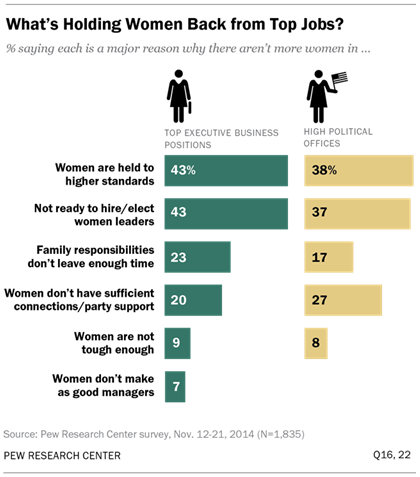 According to the bulk of Americans, women are every chip as capable of beingness skillful political leaders as men. The aforementioned tin exist said of their ability to dominate the corporate boardroom. And according to a new Pew Enquiry Center survey on women and leadership, near Americans find women duplicate from men on key leadership traits such as intelligence and capacity for innovation, with many saying they're stronger than men in terms of being compassionate and organized leaders.
According to the bulk of Americans, women are every chip as capable of beingness skillful political leaders as men. The aforementioned tin exist said of their ability to dominate the corporate boardroom. And according to a new Pew Enquiry Center survey on women and leadership, near Americans find women duplicate from men on key leadership traits such as intelligence and capacity for innovation, with many saying they're stronger than men in terms of being compassionate and organized leaders.
So why, and so, are women in curt supply at the meridian of government and business in the Usa? According to the public, at least, it's not that they lack toughness, management chops or proper skill sets.
It'south also not all nigh work-life balance. While economic research and previous survey findings take shown that career interruptions related to motherhood may make it harder for women to accelerate in their careers and compete for top executive jobs, relatively few adults in the new Pew Enquiry survey point to this as a key bulwark for women seeking leadership roles.one Only about one-in-five say women's family responsibilities are a major reason at that place aren't more than females in summit leadership positions in business and politics.
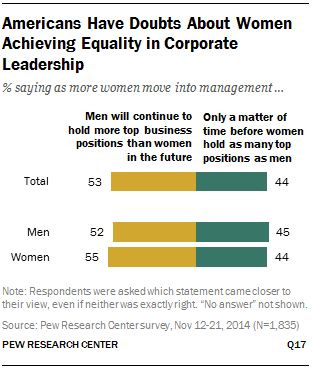 Instead, topping the listing of reasons, about four-in-x Americans point to a double standard for women seeking to climb to the highest levels of either politics or business, where they have to do more than their male counterparts to bear witness themselves. Similar shares say the electorate and corporate America are only not ready to put more women in top leadership positions.
Instead, topping the listing of reasons, about four-in-x Americans point to a double standard for women seeking to climb to the highest levels of either politics or business, where they have to do more than their male counterparts to bear witness themselves. Similar shares say the electorate and corporate America are only not ready to put more women in top leadership positions.
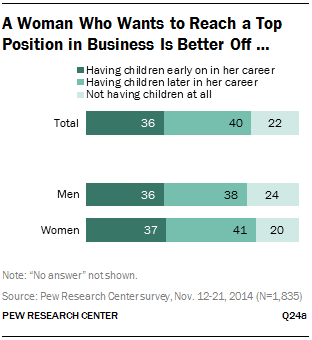 As a result, the public is divided about whether, fifty-fifty in the confront of the major advances women have fabricated in the workplace, the imbalance in corporate America will change in the foreseeable hereafter. Well-nigh half (53%) believe men will keep to concur more elevation executive positions in business in the future; 44% say information technology is only a matter of time earlier as many women are in acme executive positions every bit men. Americans are less doubtful when it comes to politics: 73% wait to see a female person president in their lifetime.
As a result, the public is divided about whether, fifty-fifty in the confront of the major advances women have fabricated in the workplace, the imbalance in corporate America will change in the foreseeable hereafter. Well-nigh half (53%) believe men will keep to concur more elevation executive positions in business in the future; 44% say information technology is only a matter of time earlier as many women are in acme executive positions every bit men. Americans are less doubtful when it comes to politics: 73% wait to see a female person president in their lifetime.
These findings are based on a new Pew Research Heart survey of i,835 randomly selected adults conducted online Nov. 12-21, 2014. The survey also finds that the public is divided over whether a woman with leadership aspirations is better off having children early on in her career (36%) or waiting until she is well established (forty%). Almost one-in-5 (22%) say the best choice would be to not have children at all.
Getting the Job Done in Politics and Business
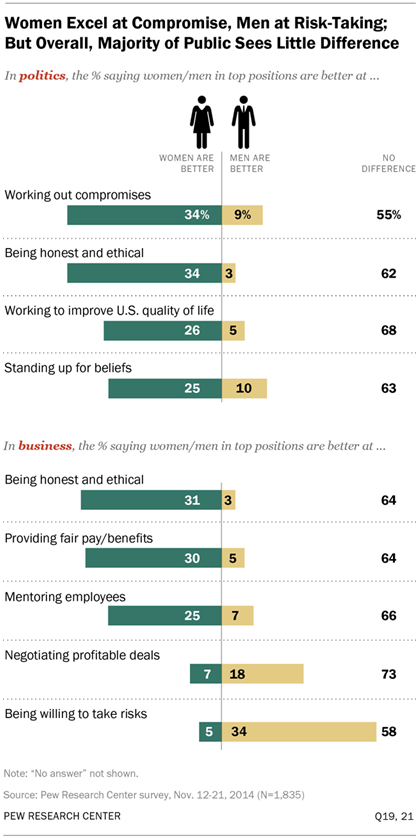 When information technology comes to characteristics that apply specifically to political and business leadership, near Americans don't distinguish betwixt men and women. But amid those who exercise draw distinctions, women are perceived to take a articulate reward over men in some fundamental areas.
When information technology comes to characteristics that apply specifically to political and business leadership, near Americans don't distinguish betwixt men and women. But amid those who exercise draw distinctions, women are perceived to take a articulate reward over men in some fundamental areas.
Political compromise has been in curt supply in contempo years, particularly in Washington, DC. Many adults (34%) call up that female politicians are improve at working out compromises than their male person counterparts. But 9% say men are better. A narrow majority (55%) say there'southward no difference between men and women in this regard.
Women are also perceived to have an edge over men when it comes to beingness honest and ethical (34% say women are improve at this; 3% say men are meliorate at it). Women have a somewhat narrower advantage over men when information technology comes to working to better the quality of life for Americans and standing upwardly for what they believe in despite political pressure. For both of these characteristics, solid majorities say at that place is no difference between men and women.
Just every bit in the political realm, the public does not encounter major differences betwixt men and women on key business leadership qualities. Where they practice come across gaps, women accept a articulate advantage over men on honesty and ethics, providing fair pay and benefits, and offering mentorship to immature employees. Men accept an edge when it comes to existence willing to accept risks and negotiating profitable deals.
Women in Leadership Today
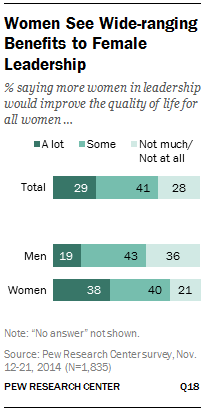 As the 114thursday Congress gets underway, a record number of women (104) will be serving in the Business firm and Senate. Today women make upwards xix% of the Congress, about double the share from twenty years ago. Progress has been slower on the corporate front. Just 26 women are now serving as CEOs of Fortune 500 companies—roughly 5%. In 1995 there were none. Women are slightly improve represented in corporate boardrooms than they are at the CEO level. As of 2013, about one-in-six board members of Fortune 500 companies (17%) were women, up from 10% in 1995.2
As the 114thursday Congress gets underway, a record number of women (104) will be serving in the Business firm and Senate. Today women make upwards xix% of the Congress, about double the share from twenty years ago. Progress has been slower on the corporate front. Just 26 women are now serving as CEOs of Fortune 500 companies—roughly 5%. In 1995 there were none. Women are slightly improve represented in corporate boardrooms than they are at the CEO level. As of 2013, about one-in-six board members of Fortune 500 companies (17%) were women, up from 10% in 1995.2
The pipeline for female leaders seems to be widening. Women have made pregnant gains in educational attainment in contempo decades, meliorate positioning themselves not only for career success just likewise for leadership positions. Since the 1990s, women take outnumbered men in both college enrollment and higher completion rates, reversing a tendency that lasted through the 1960s and '70s. And women today are more likely than men to proceed their education after college.
Women take also fabricated inroads into managerial positions and professional fields in contempo decades. In 2013, over half of managerial and professional occupations in the U.S. (52.2%) were held by women, upward from 30.half-dozen% in 1968.three Even and then, women continue to lag far behind men in senior management positions.4
Gender and Party Gaps in Views on Female person Leadership
For women, the issue of having more female leaders goes far beyond equality in the workplace. Four-in-ten of them (38%) say having more women in top leadership positions in business and government would practice a lot to meliorate the quality of life for all women. An additional xl% of women say this would have at to the lowest degree some positive impact on all women'southward lives. For their office, men are less convinced that female leadership has such wide-ranging benefits. Only 19% of men say having more women in top leadership positions would exercise a lot to ameliorate all women's lives, while 43% say this would improve women'due south lives somewhat.
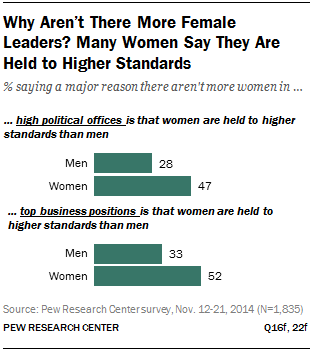 When it comes to the barriers that may be belongings women dorsum from achieving greater representation in the top leadership ranks, women are much more likely than men to point to societal and institutional factors such as the country not existence prepare to elect more than female political leaders and women being held to higher standards than men in business organization and in government.
When it comes to the barriers that may be belongings women dorsum from achieving greater representation in the top leadership ranks, women are much more likely than men to point to societal and institutional factors such as the country not existence prepare to elect more than female political leaders and women being held to higher standards than men in business organization and in government.
Women are also more probable than men to say that female leaders in both politics and business concern outperform male leaders on nearly of the traits and characteristics tested in the survey. The gender gaps in perceptions nigh political leadership are especially precipitous. Whether on compromise, honesty, backbone, persuasion or working for the benefit of all Americans, women are more likely than men to say female leaders do a better job. For their office, solid majorities of men say there aren't major differences betwixt men and women men in these areas. Nonetheless, they are somewhat more likely than women to give a nod to male leaders over female person leaders on four of the five political leadership qualities tested in the poll.
Those who identify with the Democratic Party, which dominates the ranks of elected female person leaders at the federal and land levels today, also have more than favorable impressions of the women who serve in leadership positions in authorities and in business organisation.
When information technology comes to political leadership, Democrats are significantly more likely than Republicans to say that women practise a better job than men on each of the attributes tested in the poll. For their part, Republicans are non necessarily more likely to favor men in these areas, only they are more inclined to say at that place isn't any deviation between men and women.
Democratic women in particular are strong proponents of female political leaders. In most cases, they are more probable than both Autonomous men and Republican women to say that female political leaders do a better job men.
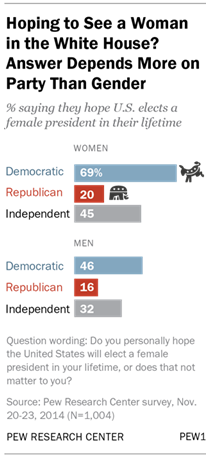 Autonomous women are also amidst the well-nigh enthusiastic most the possibility of having a female elected as president. As Hillary Clinton weighs some other run for the White House in 2016 and progressive groups urge Elizabeth Warren to arrive the race, 38% of all adults say they promise the U.South. volition elect a female president in their lifetime; 57% say it doesn't affair to them. Among Democratic women, fully 69% say they hope the U.South. volition elect a female president in their lifetime. This compares with 46% of Democratic men, xx% of Republican women and sixteen% of Republican men. To be sure, for many Republicans this view may exist more about the prospect of a Hillary Clinton presidency than well-nigh a major milestone for women, a perspective that likely influences the way they respond to this "hypothetical" question.
Autonomous women are also amidst the well-nigh enthusiastic most the possibility of having a female elected as president. As Hillary Clinton weighs some other run for the White House in 2016 and progressive groups urge Elizabeth Warren to arrive the race, 38% of all adults say they promise the U.South. volition elect a female president in their lifetime; 57% say it doesn't affair to them. Among Democratic women, fully 69% say they hope the U.South. volition elect a female president in their lifetime. This compares with 46% of Democratic men, xx% of Republican women and sixteen% of Republican men. To be sure, for many Republicans this view may exist more about the prospect of a Hillary Clinton presidency than well-nigh a major milestone for women, a perspective that likely influences the way they respond to this "hypothetical" question.
The residue of this report examines the electric current landscape of women in leadership in the U.S. and the public'due south views on this topic. Chapter 1 lays out trends in female leadership in elected political function and in corporate America, as well as changes in the pipelines to summit leadership positions. Chapter 2 looks at public attitudes on men, women and cardinal leadership traits in both the political and concern realms. And Chapter 3 explores the obstacles to leadership for women, as well as views about bigotry and the future of female person leadership.
Other Key Findings
Women are far more likely than men to see gender bigotry in today's society. About two-thirds (65%) of women say their gender faces at to the lowest degree some discrimination in society today, compared with 48% of men who believe women face some discrimination. A double-digit gender gap on perceptions of gender discrimination is evident across all generations as well as across partisan groups.
Women and men are seen as equally proficient business leaders, simply gender stereotypes persist. Well-nigh Americans (54%) say men would do a improve job running a professional sports team, while simply viii% say women would exist meliorate at this. And a 46% plurality also give men the edge when information technology comes to running a large oil or gas company. But the public is ii and a half times more likely to say a woman, rather than a human being, would do a improve job running a major hospital or a major retail chain.
Young adults are more probable than older generations to say women with leadership aspirations might want to delay having children. More than 4-in-x Millennials (46%) say a woman who wants to reach a top position in business organisation is amend off waiting to take children until she is well established in her career, while 29% say she should have children early in her career. Past contrast, four-in-10 Boomers and about half (48%) of members of the Silent generation say it's better for a woman with loftier-level business aspirations to accept children early on.
Among partisans, Republican men are the well-nigh likely to say the state has taken the steps needed to reach gender equality in the workplace. Near half of Republican men (54%) say the country has made the changes needed to give men and women equality in the workplace. By contrast near two-thirds (66%) of Republican women say more changes are needed. Even larger majorities of Autonomous and independent women and Autonomous men agree that gender parity is still a work in progress.
A Notation on Generations
Some of the assay in this written report looks at adults by generation. While the definitions of generations can differ slightly amongst researchers, this report relies on the following standard Pew Research definitions.
- Millennials: built-in afterward 1980, ages 18 to 33 in 2014.5
- Generation X: born from 1965 to 1980, ages 34 to 49 in 2014.
- Babe Boomers: born from 1946 to 1964, ages 50 to 68 in 2014.
- The Silent Generation: born from 1928 to 1945, ages 69 to 86 in 2014.6
About This Written report
This report explores public attitudes about gender and leadership with a particular focus on leadership in U.S. politics and business organisation. The assay is based on two new Pew Research Center surveys. The main survey was conducted Nov. 12-21, 2014, amongst a sample of 1,835 adults – 921 women and 914 men – xviii years of age or older. The survey was conducted by the GfK Group using KnowledgePanel, its nationally representative online research panel. A 2d survey was conducted Nov. twenty-23, 2014, among 1,004 adults, xviii years of historic period or older, living in the continental United States. This survey was conducted over the telephone (landline and cellular telephone) under the direction of Princeton Survey Research Assembly International. For a more detailed clarification of the survey methodology, run into Appendix A.
In addition to the surveys, this study draws on data from a variety of sources to certificate women in leadership positions in politics (national and land levels) and in business organisation with trends over time.
This report is a collaborative effort based on the input and analysis of the post-obit individuals. Claudia Deane, director of research practices, and Rich Morin, senior editor, provided editorial guidance. Kim Parker, manager of social trends research, and Juliana Menasce Horowitz, associate director of inquiry, designed the surveys and wrote the overview and two main survey chapters. Wendy Wang, senior researcher, and Anna Dark-brown, research assistant, compiled the data for the chapter on female leadership. Wang wrote the affiliate on female leadership. Chocolate-brown and Eileen Patten, enquiry annotator, number-checked the report. The report was copy-edited by Marcia Kramer of Kramer Editing Services. Michael Suh provided Web support. Find related reports online at www.pewresearch.org/social-trends.
Source: https://www.pewresearch.org/social-trends/2015/01/14/women-and-leadership/
0 Response to "Who Is the Leader That Have Baby While Held Power"
Post a Comment